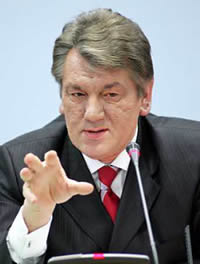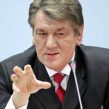
COALITION TALKS: YUSHCHENKO DECIDES TO STEP IN
Publication: Eurasia Daily Monitor Volume: 3 Issue: 105
By:

President Viktor Yushchenko will strive to carry on as the main powerbroker in Ukraine despite the constitutional reform that came into effect on January 1, 2006. This assertion was probably the main message of Yushchenko’s first speech before the new parliament elected in March. The constitutional changes were devised to weaken the president’s authority vis-à-vis the prime minister and parliament, bringing Ukraine closer to the parliamentary model of government. But Yushchenko makes no secret of his belief that it was too early to make such a step. He apparently wants to retain control over cabinet formation, taking advantage of the imperfections in the new constitutional amendments.
“From now on, the president…will assume an active role in forming the cabinet and, first and foremost, in nominating a prime minister,” Yushchenko told parliament on May 25. “I will make public the conditions under which I will agree to the candidate for prime minister proposed by a coalition,” he continued. “We must make sure that the Constitutional Court of Ukraine should start to work.” Yushchenko made this point even clearer two days later, in his regular Saturday radio address to the nation: “I hope… that parliament’s first decision will be to swear in the judges for the Constitutional Court. I will not sign a nomination for prime minister until this constitutional norm is implemented.” Further on, Yushchenko said that he would endorse a candidate for prime minister only if the candidate comes up with a “clear plan of action.”
Yushchenko has thus assumed an active role in cabinet formation, contrary to the main idea behind constitutional reform, which consisted of assigning the main role in forming the cabinet to parliament, rather than the president, as it was under Yushchenko’s predecessor, Leonid Kuchma. Article 114 of the amended constitution stipulates that the majority in parliament offers a candidate for prime minister to the president, who then submits the candidate to parliament for approval.
The constitution, however, does not make it sufficiently clear what will happen if the president rejects the candidate for prime minister, nor does it stipulate how much time the president has to endorse or oppose the candidate. Yushchenko essentially hinted to parliament that he might use this loophole if his conditions are not met.
Yushchenko has reasons to attach so much importance to the Constitutional Court issue, which has been a considerable problem since early this year when most of its judges completed their scheduled terms. The understaffed court is unable to resume it work, as the opposition in parliament, afraid that the court may help Yushchenko reverse the constitutional amendments, has blocked the swearing-in of new judges. With an operational Constitutional Court, it would also be easier to solve the language dispute between Kyiv and the eastern and southern councils that have ruled that Russian may be used locally as a language of documentation and education. The government has argued that the councils violated the constitution (see EDM, May 17, 24).
Yushchenko’s second condition — for a “clear action plan” — might mean that he will strive to retain some form of control over the activities of the executive after it has been formed. In the continuing talks on a parliamentary coalition, especially at the early stages in February-March, Yushchenko’s Our Ukraine bloc insisted that the cabinet should be guided in its work by Yushchenko’s action plan. Yulia Tymoshenko, who wants to return to the post of prime minister, from which Yushchenko fired her last September, has opposed this condition, insisting that the prime minister should be a more independent figure.
Yushchenko’s proclaimed intention to play a more active role in forming the cabinet should mean that he will also take a more active part in the coalition talks. It is not clear whether this will prompt the key Orange partner — Tymoshenko — to become more flexible. So far Yushchenko’s close allies who have been holding the talks — Roman Bezsmertny, Yuriy Yekhanurov, and Anatoly Kinakh — have failed to persuade Tymoshenko to drop her prime ministerial ambition.
The lack of progress in the coalition talks among Our Ukraine, Tymoshenko, and the Socialists has blocked the work of parliament. Just several hours after it convened on May 25, parliament voted to adjourn until June 7. The three Orange Revolution forces have promised to finally come up with an agreement on a majority coalition in parliament by that date. So far, however, little progress has been made.
The three cannot decide on a prime minister, and they have preliminarily agreed that this should be the subject of separate talks after they have formed a coalition. It is also not clear who will be speaker of parliament. On May 26 Tymoshenko categorically denied a report by Ukraina moloda, a newspaper close to Yushchenko, suggesting that she had agreed that the post of speaker should go to Yushchenko’s ally Petro Poroshenko.
(Channel 5, May 25; Ukraina moloda, Interfax-Ukraine, May 25; Radio Era, Zerkalo nedeli, May 27)




